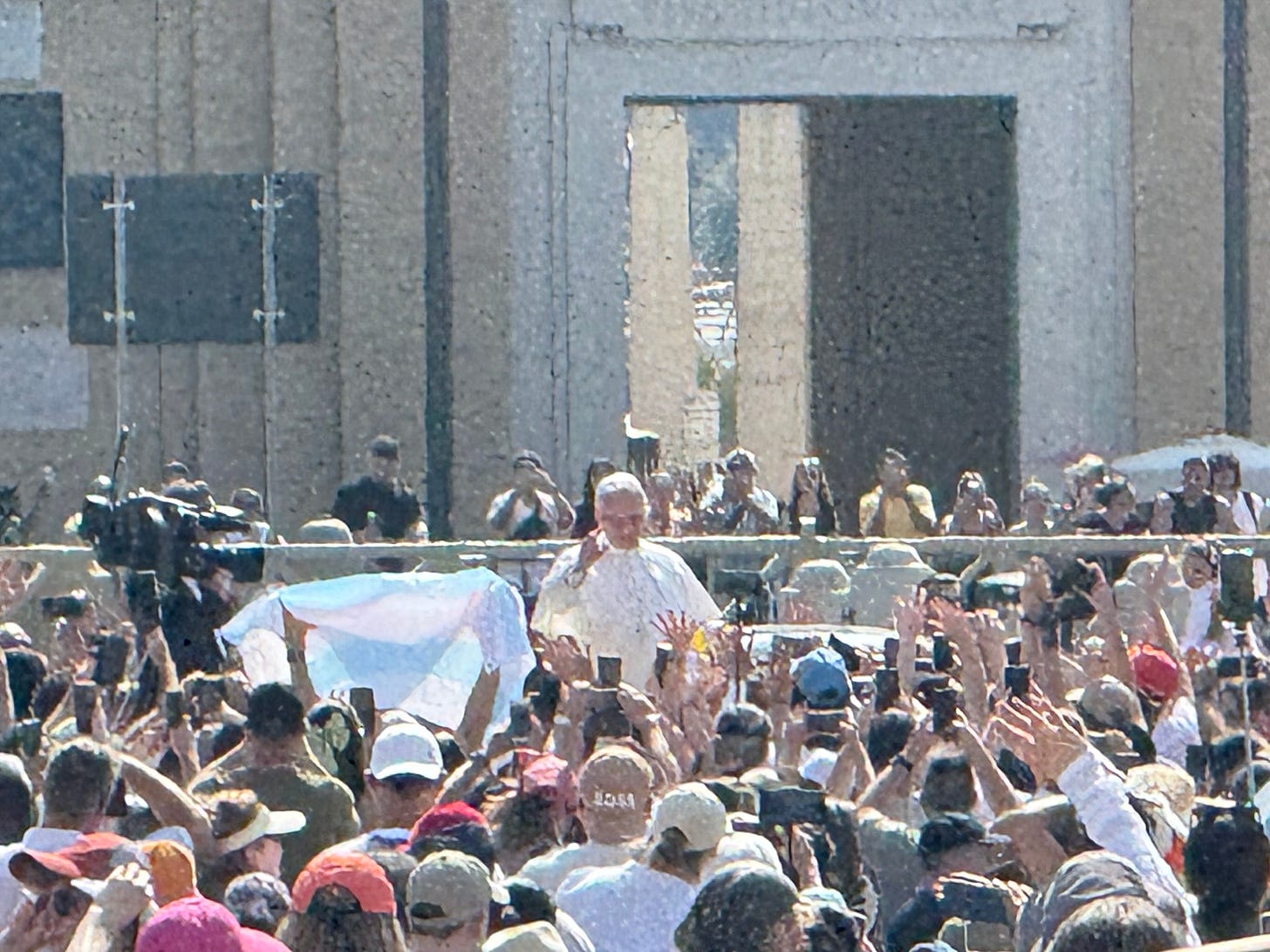From Rome to Silver Spring, too many expect faith leaders to echo partisan identities. But the church’s mission is spiritual, not ideological.
Photo by the author – June 18, 2025
By Michael Peabody –
On May 8, 2025, Cardinal Robert Francis Prevost—an Augustinian missionary and canon lawyer from Chicago—was elected the 267th Bishop of Rome. Taking the name Pope Leo XIV, he became both the first North American pope and the fourteenth to bear the name Leo. His election was historic, but the reactions it sparked in the United States were revealing.
Many American observers quickly filtered his papacy through a familiar lens: politics. Would Leo XIV support conservative social teaching or align with progressive environmental causes? Would he affirm their particular side in America’s ongoing culture wars? When he did neither, disappointment followed.
This was not a failure on Leo’s part. It was the product of misplaced expectations. The pope is not chosen to be a partisan champion, but to shepherd the global Catholic Church.
A Familiar Adventist Parallel
Adventists know this dynamic well. Every five years, the election of a General Conference president becomes, for some, less about mission and more about politics. Conservatives hope for a leader who will reinforce their vision; progressives long for one who will embrace reform. When the chosen leader does not deliver ideological affirmation, frustration inevitably follows.
But the role of a faith leader is not to mirror partisan divides. The task is to call people to faithfulness in Christ.
A Biblical Mandate for Independence
Scripture repeatedly demonstrates that God’s messengers transcend human political categories. When Joshua asked the commander of the Lord’s army, “Are you for us or for our adversaries?” the reply was blunt: “Neither, but as commander of the army of the Lord I have now come” (Joshua 5:13–14).
Jesus, when interrogated by Pilate, declared: “My kingdom is not of this world” (John 18:36). His mission was not to sanctify earthly politics but to inaugurate a kingdom beyond them.
The apostle Paul instructed Timothy to “preach the word… correct, rebuke, and encourage” (2 Timothy 4:2). Leadership in the church, in other words, is about fidelity to the gospel—not policy platforms.
When Church and Politics Collide
History warns us of the dangers of conflating the two. Medieval papacies became ensnared in alliances with kings and emperors, sacrificing spiritual integrity for political gain. Those compromises fueled corruption and, ultimately, the Reformation.
Adventists, born in the 19th century, emerged with a deep skepticism of such entanglements. Ellen White consistently urged independence from politics, reminding the church that its mission is spiritual, not partisan.
The election of Leo XIV is a reminder of that principle. He is not a politician in robes but a pastor called to lead the global flock.
The American Temptation
Why do so many in the U.S. expect otherwise? Because in American culture, politics is identity. To be conservative or progressive is not simply to cast a vote; it is to belong to a tribe, often one more defining than faith itself.
So when a pope—or a General Conference president—fails to validate that identity, it feels personal. Yet Paul reminds us in Philippians 3:20: “Our citizenship is in heaven.” That is where allegiance ultimately lies, not in the platforms of earthly parties.
Domestic and International Implications
When faith leaders are judged by their political alignment, even domestic values are reshaped by partisanship. Families, churches, and communities begin to measure sermons by whether they echo ideological talking points rather than whether they reveal Christ.
The same expectation extends to international conflicts. In wars abroad—whether in Ukraine, the Middle East, or elsewhere—believers often look to their leaders to declare one side morally righteous and the other evil. But as Jesus taught in Mark 12:17, “Give to Caesar what is Caesar’s, and to God what is God’s.” Leaders may pray for peace and justice, but they must remain above the battlefield of national loyalties.
A Call to Individual Faithfulness
At the heart of this issue lies individual discipleship. If we demand political alignment from our leaders, it often reveals that we have allowed politics to eclipse faith in our own lives. Scripture sets a different standard: “He has shown you, O man, what is good… to act justly, to love mercy, and to walk humbly with your God” (Micah 6:8).
These values cannot be reduced to party platforms. They are kingdom values. And when believers live by them, they stop demanding that faith leaders serve as partisan avatars.
Conclusion
The lesson of Pope Leo XIV’s election is not about whether he validates American expectations. It is about whether he remains faithful to his calling. The same holds true for Adventist leaders.
Faith leaders are not chosen to fight our political battles. They are chosen to point us to God. Their independence from partisan entanglements is not weakness but strength, allowing them to lead a global community toward the kingdom of Christ—a kingdom that is not of this world.The real question, then, is not: Do they represent me? The real question is: Do they represent Him?
